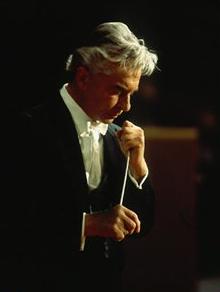


Herbert Von Karajan, perhaps was the most famous conductor of the 20th century. As a traditional German conductor, Karajan was an authoritative successor of the art of conducting. His achievement covered variety composers of different periods. From Beethoven to Brahms, from Wagner to Richard Strauss, Karajan made considerable recordings of classical music. His recordings, spanning more than half a century, traced a history of the mediumís technical evolution. Although Karajan was arguable for his commanding personality, especially in his later years, his contributions for classical music and modern medium were hard to surpass.
Karajan was born on April 5, 1908, in Salzburg, Austria. He became the cityís most famous son after Mozart. He began piano lessons as a four-year-old. Later, he went to grammar school in Salzburg and at the same time to the Mozarteum. Originally, the young Karajan wanted to be an engineer, and the Technical University in Vienna accepted him. However, Karajan finally chose music to be his career. His teacher Bernard Paumgartner recommended that he go to Franz Schalk (Brucknerís student) and Alexander Wunderer at the Vienna Music Academy. He studied at the Vienna Music School from 1926 to 1928.
From 1928 to 1934, he was choirmaster and later conductor at the Ulm City Theatre. In 1929, he gave his first concert at the Mozarteum. From 1930-34, he ran the international conductor's courses during the annual Salzburg Festival. Karajan made his debut at the Vienna Opera in 1937 and a year later at the Berlin Opera, where he remained from 1939 until 1945 as state music director. In 1948, he made his debut at the Salzburg Festival with Le nozze di Figaro (Mozart). A year later, he conducted German operas at La Scala in Milan. In the fifties, he regularly conducted at Italy's most important opera house. Walter Legge then brought him to London to conduct the newly founded Philharmonic Orchestra. In 1951, he was invited to the re-opening of the Bayreuth Festival.
After Furtwängler died in 1954, Karajan was appointed "conductor for life" of the Berlin Philharmonic at his own insistence. In 1967, Karajan created the Salzburg Easter Festival; he annually directed an opera conducted by himself, beginning with Wagner's The Ring. Karajan became known as the "General Music Director of Europe" from the 1950ís to the 1970ís. He towered over European musical life as no one had done before. In 1977, Karajan fell seriously ill and could hardly work for years as one leg was almost completely paralyzed. An operation in 1983 was successful, enabling him to walk again and stand upright. Nevertheless, he gave up the post of conductor of the Berlin Philharmonic Orchestra after a long dispute in 1989. In his last years, the Vienna Philharmonic was the only orchestra he conducted. His last recording was Bruckner's Symphony No. 7 with the Vienna Philharmonic Orchestra. Herbert Von Karajan died in Salzburg on July 16, 1989.
Karajan, who was both loved and hated, was undoubtedly the most outstanding conductor of the 20th century. The Berlin Philharmonic Orchestra became a musical body of unequalled perfection due to his all-encompassing knowledge of orchestral potential and of each individual player, his stubbornness and the constant demands he made of his musicians. In the process, he was forever questioning himself. A comparison of his various renderings during his lifetime of the same works (Beethoven and Brahmsí symphonies, for example) shows that he was a music giant who never stood still.


